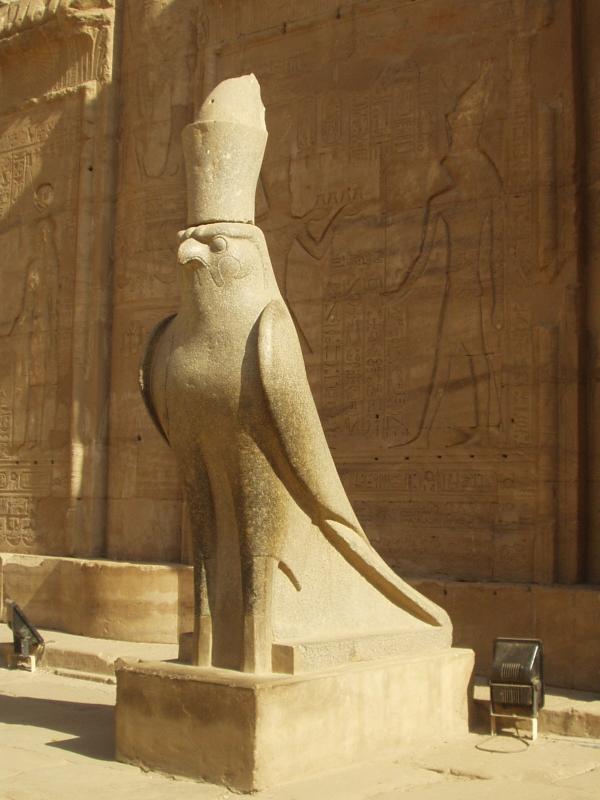~ HERU ~
There are a great deal of misunderstandings that have gained permanence in the thinking of the majority of “egyptologists”. Leading these is the popular misconception that Heru is the sun god. It is damaging on two counts. For one, it is a perversion of the true meaning of the deity, and for another, it perpetuates the slur that African people worship material things (sun, rivers, lakes, animals, etc.).
In a qualified sense we can say that the sun is used as a metaphor to lead thinking to the understanding of the set of phenomena under the control of the natural force labeled “Heru”. Specific to our present consideration is the division of the human metabolism into two phases; one is characterized by the rise of bodily temperature, and the other by its decrease.
Each phase has its set of temperature (temperament) dependent or related physiological and psychical functions. Those that are directly related and dependent on the rise in temperature above the mean, can be metaphorized as “solar” (the very extreme stages, as martial). The opposite phase is assigned to “the moon”, “mercury” and “saturn”. The mean between those two extremes is assigned to “venus” and “jupiter”. Heru corresponds, therefore, to the “solar” phase of the psycho-physical metabolic cycle, which is mediated by noradrenalin and other chemicals of the sympathetic nervous system. It enables us to become and remain awake (Pert em Heru!), to externalize our focus of consciousness, to reason, pay attention, to carry out our will, to utilize the organs and faculties of external activity (eyes, frontal part of the cerebrum, hands, legs, etc.).
Heru corresponds to our will, which is the freedom to follow or reject divine law, and our emotions. This freedom is the crux of our divinity. Without it, man would be compelled to follow the structural shaping forces of order which manifest in the 10th sphere as the “instincts” that compel all other creatures to obey the law, in which case he could not be held accountable to law, human or divine, let alone be considered the “likeness of God”.
Hence, spiritual growth occurs only when behavior and actions are initiated independent of emotional impulses (i.e., one ignores them). Many people are ignorant of the intrinsic freedom of their will, or are so habituated to acting out of emotional impulsion, or seeming compulsion, that they voluntarily renounce their intrinsic mastery over their spirit. This defaulting to the emotions is represented by Heru Khenti an Maati, or “Heru the Blind”.
The other common misconception about the will is the belief that “power” is an attribute of it. The ability to achieve one’s will is, therefore, spoken of as “strength of will”, etc. But the very factors that make the will intrinsically free of emotional (the power part of our being) influence, also denies it of power as its attribute. A major correspondence of Heru (Shango, the “sun”, etc.) is the king (and all people in authority). His function is to command the people and the army to carry out works. He does not have the power to do it himself. Similarly, when we declare our will to achieve a goal or carry out a behavior, we are commanding another part of our being which possesses the attributes of power.
This is Ra, our life-force. It is of interest to note that the symbol of Ra is a serpent surmounting the solar disk, and all of its creative functions are carried out through the agency of hekau (words of power). We should not be surprised that the most primitive, hence most powerful part of our brain, the “reptilian brain” or R-complex, is responsive to sound waves and rhythm and not ideas. Perhaps some day, Western psychologists will realize that this part of the brain is the doorway to the root shaping factors of our behavior, as well as the powers of nature. The supreme way, then, of willing events is through the chanting of the heka controlling the physical manifestation.
This manner of declaring our will is symbolized by Heru-Pa-Khart (Harpocrates), i.e., “Heru, the child”. He is depicted emerging from a lotus wearing the red and white crown, holding the flail and crook (see Appendix A) in one hand, while making the sign of silence and of chanting hekau. The lotus, which is a flower that requires a great deal of sunlight (it closes with the setting sun, opens with its rising) is a symbol of the psychic centers (chakras) wherein manifest the forces represented by the words of power. The “sign of silence and chanting hekau,” which is made by pointing the index finger to the mouth, symbolizes chanting combined with the cessation of ideation as the supreme means of expressing the will.
Our willingness to carry out our will, as we all know so well, depends greatly on our state of vitality. Heru is assisted in his work of protecting the work of Ausar on our behalf by his four children; Hapi, who represents a northern force and protects the small viscera of the body; Tuamutef represents the eastern, and protects the heart and the lungs; Amset represents the southern, and protects the stomach and large intestines, and Qebhsennuf represents the western, and protects the liver and gall bladder.
There is more than just mere symbolism at work here. But the heart of the teaching is that by observing order, regularity, and the cycles governing the body’s functions, the health of the vital organs were insured, and thus the vitality. It is thus that we secure and preserve the ability to maintain the clarity of mind that is necessary for the practice of Men Ab, and the sense of vitality that supports our willingness to carry out our will. Compare this with the common belief, even among psychologists and “mind power experts”, that “will power” is developed through “mental exercises”.
© Ra Un Nefer Amen
(Home)
We Dedicate This Website To
"THE MOTHER" AND "THE WAY" OF "THE MOTHER"
